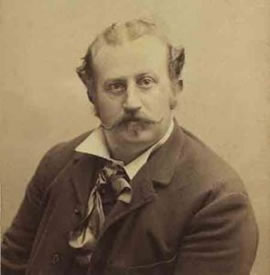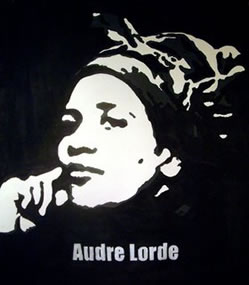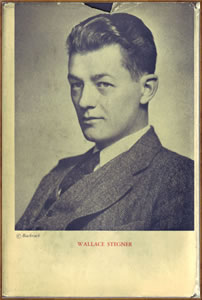De Amerikaanse schrijfster Jean Marie Auel werd geboren op 18 februari 1936 in Chicago. Zie ook mijn blog van 18 februari 2007 en ook mijn blog van 18 februari 2008 en ook mijn blog van 18 februari 2009.
Uit: The Plains of Passage
„The woman caught a glimpse of movement through the dusty haze ahead and wondered if it was the wolf she had seen loping in front of them earlier.
She glanced at her companion with a worried frown, then looked for the wolf again, straining to see through the blowing dust.
“Jondalar Look!” she said, pointing ahead.
Toward her left, the vague outlines of several conical tents could just be seen through the dry, gritty wind.
The wolf was stalking some two-legged creatures that had begun to materialize out of the dusty air, carrying spears limed directly at them.
“I think we’ve reached the river, but I don’t think we’re the only ones who wanted to camp there, Ayla,” the man said, pulling on the lead rein to halt his horse.
The woman signaled her horse to a stop by tightening a thigh muscle, exerting a subtle pressure that was so reflexive she didn’t even think of it as controlling the animal.
Ayla heard a menacing growl from deep in the wolf’s throat and saw that his posture had shifted from a defensive stance to an aggressive one. He was ready to attack! She whistled, a sharp, distinctive sound that resembled a bird call, though not from a bird anyone had ever heard. The wolf gave up his stealthy pursuit and bounded toward the woman astride the horse.
“Wolf, stay close!” she said, signaling with her hand at the same time. The wolf trotted beside the dun yellow mare as the woman and man on horseback slowly approached the people standing between them and the tents.“

Jean M. Auel (Chicago, 18 februari 1936)
De Hongaarse schrijver en journalist Mór Jókai werd geboren op 18 februari 1825 in Komárom. Zie ook mijn blog van 18 februari 2009.
Uit: The Nameless Castle (Vertaald door S. E. Boggs)
„A snow-storm was raging with such vigor that any one who chanced to be passing along the silent thoroughfare might well have believed himself in St. Petersburg instead of in Paris, in the Rue des Ours, a side street leading into the Avenue St. Martin. The street, never a very busy one, was now almost deserted, as was also the avenue, as it was yet too early for vehicles of various sorts to be returning from the theatre.
The street-lamps on the corners had not yet been lighted. In front of one of those old-fashioned houses which belong to a former Paris a heavy iron lantern swung, creaking in the wind, and, battling with the darkness, shed flickering rays of light on the child who, with a faded red cotton shawl wrapped about her, was cowering in the deep doorway of the house. From time to time there would emerge from the whirling snowflakes the dark form of a man clad as a laborer. He would walk leisurely toward the doorway in which the shivering child was concealed, but would turn when he came to the circle of light cast on the snowy pavement by the swinging lantern, and retrace his steps, thus appearing and disappearing at regular intervals. Surely a singular time and place for a promenade! The clocks struck ten – the hour which found every honest dweller within the Quartier St. Martin at home. On this evening, however, two belated citizens came from somewhere, their hurrying footsteps noiseless in the deep snow, their approach announced only by the lantern carried by one of them – an article without which no respectable citizen at the beginning of the century would have ventured on the street after nightfall. One of the pedestrians was tall and broad-shouldered, with a handsome countenance, which bore the impress of an inflexible determination; a dimple indented his smoothly shaven chin. His companion, and his senior by several years, was a slender, undersized man.
When the two men came abreast of the doorway illumined by the swinging lamp, it was evident that they had arrived at their destination. They halted and prepared to enter the house.
At this moment the child crouching in the snow began to sob.
“See here!” exclaimed the taller of the two gentlemen. “Here is a little girl.”
“Why, so there is!” in turn exclaimed the elder, stooping and letting the light of his lantern fall on the child’s face. “What are you doing here, little one?” he asked in a kindly tone.
“I want my mama! I want my mama!” wailed the child, with a fresh burst of sobs.“

Standbeeld in Komarno
De Duitse schrijfster Hedwig Courths-Mahler werd geboren in Nebra (Saksen-Anhalt) op 18 februari 1867. Zie ook mijn blog van 18 februari 2009.
Uit: Griseldis
„Der Sturm heulte und brauste über Wälder und Felder, beugte die stärksten Bäume, daß sie ihre Kronen schüttelten, die noch keine grünen Blätter trugen, und knickte in den Forsten junge Bäumchen.
Ein solcher Sturm, der den Regen schräg niederprasseln ließ, machte einen Aufenthalt im Freien nicht angenehm. Dieser Ansicht war auch der Kraftwagenlenker, der ein Gefährt durch den sturmzerwühlten Wald lenkte. Der Kraftwagen fuhr langsam und vorsichtig, denn die Dunkelheit war bereits hereingebrochen, und hie und da lag ein vom Sturm geknickter Baumstamm über dem Weg.
Neben dem Fahrer saß ein Diener. Dieser mußte wiederholt aussteigen, um die Hindernisse aus dem Weg zu räumen.
»Es ist, als wären heute alle Teufel los«, sagte er ärgerlich.
»Das reine Höllenwetter.«
Sie sahen scheu nach dem Kraftwagen, der indessen am Weg stand. Einen Augenblick war an dem Fenster des Gefährtes ein blasses Männerantlitz erschienen, aus dem die Augen düster schauten. Der Insasse des Wagens hatte sich anscheinend wieder teilnahmslos in die Kissen zurückgelehnt, als der Weg wieder frei war. Und bald darauf fuhr der Wagen aus dem Wald und einen allmählich ansteigenden Berg hinan.
Dort oben lag das Schloß Treuenfels.
Wie eine gewaltige Silhouette hob es sich mit seinen Zinnen und Türmen, mit seinen Erkern und Säulen gegen den von zerrissenen Wolken bedeckten Himmel ab. Zuweilen lugte der Mond zwischen Wolkenfetzen und beleuchtete matt die Gegend.
Wie ein Märchenschloß lag Schloß Treuenfels auf dem Berg, als sei kein Leben in seinen gewaltigen Mauern.“

Hedwig Courths-Mahler (18 februari 1867 – 26 november 1950)
De Noorse schrijver Alexander Lange Kielland werd geboren in Stavanger op 18 februari 1849. ook mijn blog van 18 februari 2009.
Uit: Daniel Jürges Zweifel (Vertaald door Marie en Friedrich Leskien)
„Aber Daniel Jürges litt durch dieses Haus und diese Kränkung mehr, als jemand ahnte.
Denn es war seiner Natur so gänzlich zuwider, das Häßliche vor Augen zu haben. Seine Lebensanschauung war ideal, und die klassischen Studien hatten seinen Geist dem Schönen und Guten zugewandt. In seinen Studentenjahren war er der beste Lateiner gewesen und später ein großer Redner und Liederdichter im Studentenverein. Er war einer der wenigen Theologen, die überall mit dabei sein können, ohne sich zu kompromittieren und ohne den andern das Vergnügen zu verderben. Er entstammte einem alten Beamtengeschlecht, das seit Generationen die verschiedensten Ämter rings im Lande innegehabt hatte – die Augen beständig auf eins der Ministerien gerichtet.
In ihren Adern floß ursprünglich dänisches oder deutsches Blut, und wenn auch manche Mischung stattgefunden hatte, so blieb doch immer bei Familien wie dieser etwas von dem Fremden bestehen, was man früher für vornehm hielt. Und da das Leben sie in ihrem beständigen Trachten nach besseren Ämtern bald hierhin, bald dorthin führte und daher in den heranwachsenden Kindern keine rechte Liebe zur engeren Heimat aufkommen ließ, gewöhnten sie sich allmählich daran, das ganze Land als ein gutes Departement zu betrachten, wo man mit geringerer Anstrengung und viel Geduld stetig avancierte.
Da sie die fortwährenden Versetzungen und den Wechsel in den Ämtern in der Zeitung der Hauptstadt und dem Staatskalender verfolgen mußten, entwickelte sich in diesen Beamtenfamilien eine außerordentliche Personalkenntnis. Und die juristischen Beamten mußten zugleich die Geistlichen und Ärzte im Auge behalten; denn durch Heirat und sonstige Verbindungen hingen sie alle miteinander zusammen, bis zu den Bischöfen und Ministern hinauf, die die Fäden in der Hand hielten. Daher wurde ihr Interesse fast ausschließlich für dieses Beamtennetz in Anspruch genommen, so daß sie Unterschiede oder Veränderungen in dem Volk, worüber es ausgespannt war, weniger fühlten.“

Alexander Kielland (18 februari 1849 – 6 april 1906)
De Afro-Amerikaanse schrijfster, dichteres en lesbisch-feministische, anti-racistische activiste Audre Geraldine Lorde werd geboren op 18 februari 1934 in New York. Zie ook mijn blog van 18 februari 2009.
The Electric Slide Boogie
New Year’s Day 1:16 AM
and my body is weary beyond
time to withdraw and rest
ample room allowed me in everyone’s head
but community calls
right over the threshold
drums beating through the walls
children playing their truck dramas
under the collapsible coatrack
in the narrow hallway outside my room
The TV lounge next door is wide open
it is midnight in Idaho
and the throb easy subtle spin
of the electric slide boogie
step-stepping
around the corner of the parlor
past the sweet clink
of dining room glasses
and the edged aroma of slightly overdone
dutch-apple pie
all laced together
with the rich dark laughter
of Gloria
and her higher-octave sisters
How hard it is to sleep
in the middle of life.

Audre Lorde (18 februari 1934 – 17 november 1992)
De Amerikaanse schrijver Wallace Stegner werd geboren op 18 februari 1909 in Lake Mills, Iowa. Zie ook mijn blog van 18 februari 2009.
Uit: Angle of Repose
„Rodman, like most sociologists and most of his generation, was born without the sense of history. To him it is only an aborted social science. The world has changed, Pop, he tells me. The past isn’t going to teach us anything about what we’ve got ahead of us. Maybe it did once, or seemed to. It doesn’t any more.
Probably he thinks the blood vessels of my brain are as hardened as my cervical spine. They probably discuss me in bed. Out of his mind, going up there by himself . . . How can we, unless . . . helpless . . . roll his wheelchair off the porch who’d rescue him? Set himself afire lighting a cigar, who’d put him out? . . . Damned old independent mule-headed . . . worse than a baby. Never consider the trouble he makes for the people who have to look after him . . . House I grew up in, he says. Papers, he says, thing I’ve always wanted to do . . . All of Grandmother’s papers, books, reminiscences, pictures, those hundreds of letters that came back from Augusta Hudson’s daughter after Augusta died . . . A lot of Grandfather’s relics, some of Father’s, some of my own . . . Hundred year chronicle of the family. All right, fine. Why not give that stuff to the Historical Society and get a fat tax deduction? He could still work on it. Why box it all up, and himself too, in that old crooked house in the middle of twelve acres of land we could all make a good thing out of if he’d consent to sell? Why go off and play cobwebs like a character in a Southern novel, out where nobody can keep an eye on him?
They keep thinking of my good, in their terms. I don’t blame them, I only resist them. Rodman will have to report to Leah that I have rigged the place to fit my needs and am getting along well. I have had Ed shut off the whole upstairs except for my bedroom and bath and this study. Downstairs we use only the kitchen and library and the veranda. Everything tidy and shipshape and orderly. No data.“

Wallace Stegner (18 februari 1909 – 13 april 1993)
